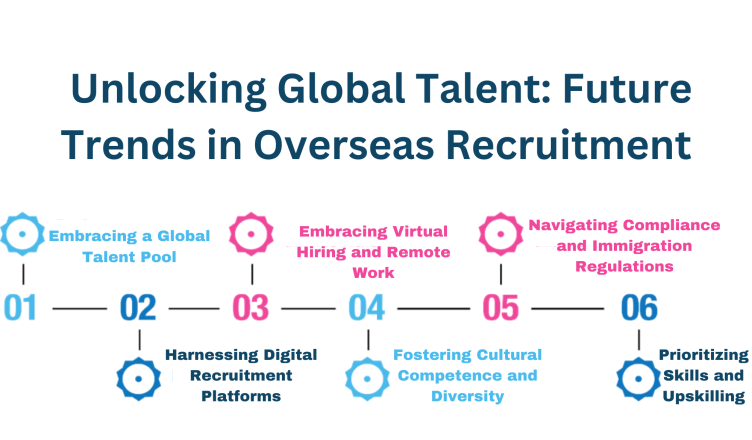Introduction:
In today’s interconnected world, international recruitment plays a pivotal role in organizations’ quest to tap into a global talent pool. The future of overseas recruitment is undergoing significant transformations as emerging trends reshape the landscape of talent acquisition across borders. This blog post explores these trends and their potential impact on the future of talent acquisition.
Embracing a Global Talent Pool:
Globalization empowers companies to seek the best talent worldwide, transcending geographical boundaries. Advancements in technology and remote work capabilities facilitate accessing highly skilled professionals irrespective of their physical location.
Harnessing Digital Recruitment Platforms:
Digital recruitment platforms, job portals, and social media networks revolutionize how organizations connect with candidates worldwide. These platforms streamline the recruitment process using advanced algorithms, data analytics, and AI-driven matching technologies. They empower both employers and job seekers to efficiently find the perfect match.
Embracing Virtual Hiring and Remote Work:
The COVID-19 pandemic accelerated the adoption of virtual hiring practices and remote work arrangements. This trend reshapes the future of overseas recruitment by offering effective alternatives to traditional in-person methods. Virtual interviews, online assessments, and remote onboarding eliminate the need for physical relocation, enabling cost savings, flexibility, and access to a broader talent pool.
Fostering Cultural Competence and Diversity:
In a globalized business landscape, organizations recognize the value of cultural competence and diversity. International recruitment emphasizes attracting candidates from diverse backgrounds to drive innovation, creativity, and a wider range of perspectives. Employers actively seek individuals with cross-cultural competencies, enabling them to thrive in multicultural work environments and foster inclusive organizational cultures.
Prioritizing Skills and Upskilling:
Rapid technological advancements reshape job market demands. Future overseas recruitment focuses on candidates with in-demand skills or the potential for upskilling to adapt to evolving requirements. Partnerships with educational institutions and training programs bridge skill gaps, ensuring a future-ready workforce.
Navigating Compliance and Immigration Regulations:
Compliance with immigration laws and regulations is critical in international recruitment. Staying updated on changing regulations and ensuring compliance becomes imperative. Engaging specialized immigration consultants or partnering with global mobility firms streamlines the process, allowing organizations to concentrate on attracting and retaining top international talent.
Conclusion:
The future of overseas recruitment offers organizations the immense potential to access a diverse talent pool and enhance global competitiveness. Emerging trends such as the globalization of talent, digital recruitment platforms, virtual hiring and remote work, cultural competence and diversity, skills-focused approaches, and compliance with immigration regulations shape the landscape of international talent acquisition. By embracing these trends, organizations position themselves for success in a rapidly evolving global marketplace, securing the best talent worldwide.

